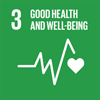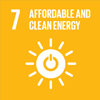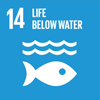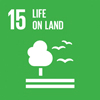Examining the Opportunities and Challenges of the Green Economy in Indonesia
- Details
- Written by Adella
- Category: News
- Hits: 1254
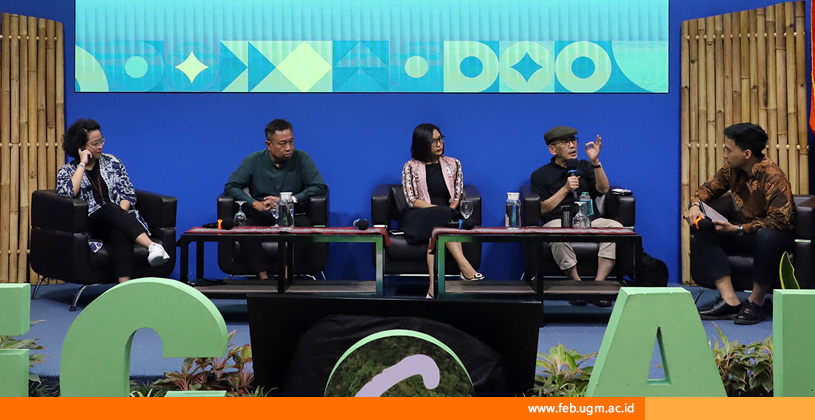
Multi-stakeholder collaboration is essential to answer challenges and maximize opportunities in efforts to transform Indonesia towards a green economy. This came to the fore in the Green Economy Talkshow, which was one of a series of Economics Care Environment (ECAN) 2024 events which took place on Saturday (10/5) in the Auditorium of the UGM Faculty of Economics and Business (FEB) Learning Center Building.
The talk show, Growing Resilient Economies through Environmental Narratives, was organized by the Student Executive Board (BEM) FEB UGM in collaboration with Greenpeace Indonesia. This talk show presented four main speakers, namely Faisal H. Basri, S.E., M.A., senior Indonesian economist and FEB UI lecturer, Tiza Mafira, S.H., LL.M., Director of the Indonesian Climate Policy Initiative, Tata Mutasya, S.E., M.A., Senior Campaign Greenpeace International Strategist, as well as Sekar Utami Setiastuti, S.E., M.Sc., Ph.D., researcher and lecturer at FEB UGM.
On that occasion, Faisal H. Basri, S.E., M.A. highlighted various geopolitical risks in 2024, such as Russia-NATO tensions, cyber-attacks, US-China strategic competition, and increasing climate risks. According to UNEP, he emphasized that a green economy must be low-carbon, resource-efficient and socially inclusive. "This means that public and private investment must be directed at economic activities that reduce carbon emissions and pollution, increase energy and resource efficiency, and prevent the loss of biodiversity," he said.
Not only that, Faisal also emphasized the importance of adopting sustainable development by considering economic, social and environmental aspects in a balanced manner. He also stressed the importance of policy reforms that ensure intergenerational justice. "There needs to be changes in fiscal policy and environmental management to prevent over-exploitation and ensure sustainable and fair development for all parties," he said.
Meanwhile, regarding preparing public policies, including the green economy, Tiza Mafira, S.H., LL.M., conveyed the importance of involving the community in policymaking. A policy-making process that consists of the community ensures broader representation, relevance, effectiveness and sustainability of policies, with a holistic approach that maintains economic growth and environmental sustainability.
Tata Mutasya, S.E., M.A. also conveyed the change in economic paradigm. He mentioned the need to change the old financial paradigm, which considers environmental damage a typical economic development cost. According to him, the economy should not use resources that exceed nature's regenerative capacity (overshoot) and fail to meet people's basic needs (shortfall). "Design to regenerate and create to distribute must be at the core of economic development to ensure a system that improves the environment and distributes value fairly," he stressed.
To encourage a welfare-oriented economy, Tata proposed several vital steps. First, changing the paradigm from value extraction to value creation means that economic development does not damage the environment and provides opportunities for nature to recover. Second, fiscal reform includes high taxes on the wealthiest groups (crazy rich) and environmental polluters, as well as APBN, APBD and BUMN spending on public goods and the green transition. Third, the private sector must switch to green business, build clean and renewable energy, and set a zero emission reduction target by 2050. Finally, innovation and technology must be developed at the city, regional and private sector levels to support the transformation towards a more sustainable economy.
Meanwhile, Sekar Utami Setiastuti, S.E., M.Sc., Ph.D., focused a lot on the economics of pollution and the impact of climate change in the talk show. She said that economic production causes environmental damage that costs resources and welfare more than the value of the goods produced. Pollution creates social costs that are higher than private costs, so the optimal amount of production must be smaller than the market equilibrium amount. This condition raises the risk of climate change, both physical dangers such as global warming, which causes gradual changes and extreme natural disasters, and transition risks related to the shift towards a green economy.
Sekar emphasized the need for coordinated climate mitigation and adaptation policies to overcome these challenges. Indonesia has adopted a national agenda to address climate change through energy diversification and conservation. Dynamic stochastic general equilibrium (DSGE) models of the environment show that monetary and fiscal policies can reduce emissions and carbon stocks in the atmosphere, even though they can also reduce green production.
“Even though world countries, including Indonesia, have promised to reduce carbon emissions by 2030, implementing carbon taxes and plastic excises policies is not easy. Therefore, greater financial incentives are needed through the banking sector or directly from the government to accelerate the growth of green innovation, especially when traditional economic approaches fail," she explained.
Reportage: Adella Wahyu Pradita
Sustainable Development Goals
